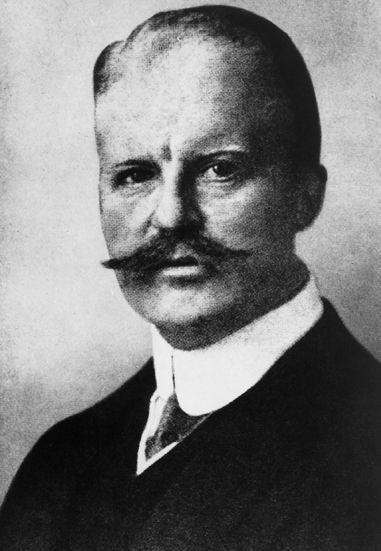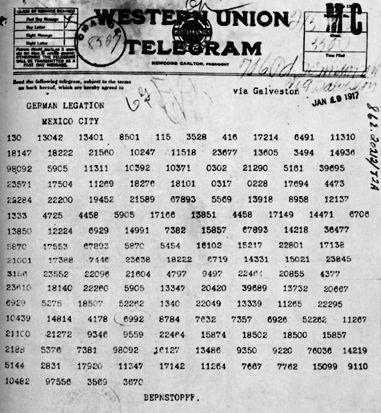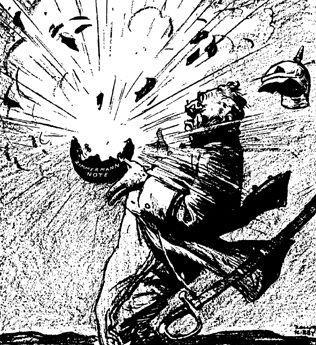The Code Book (20 page)
In the three weeks that remained, Zimmermann devised an insurance policy. If unrestricted U-boat warfare increased the likelihood of America entering the war, then Zimmermann had a plan that would delay and weaken American involvement in Europe, and which might even discourage it completely. Zimmermann’s idea was to propose an alliance with Mexico, and persuade the President of Mexico to invade America and reclaim territories such as Texas, New Mexico and Arizona. Germany would support Mexico in its battle with their common enemy, aiding it financially and militarily.
Furthermore, Zimmermann wanted the Mexican president to act as a mediator and persuade Japan that it too should attack America. This way, Germany would pose a threat to America’s East Coast, Japan would attack from the west, while Mexico invaded from the south. Zimmermann’s main motive was to pose America such problems at home that it could not afford to send troops to Europe. Thus Germany could win the battle at sea, win the war in Europe and then withdraw from the American campaign. On January 16, Zimmermann encapsulated his proposal in a telegram to the German Ambassador in Washington, who would then retransmit it to the German Ambassador in Mexico, who would finally deliver it to the Mexican President.
Figure 28
shows the encrypted telegraph; the actual message is as follows:

Figure 27
Arthur Zimmermann. (
photo credit 3.1
)
We intend to begin unrestricted submarine warfare on the first of February. We shall endeavor in spite of this to keep the United States neutral. In the event of this not succeeding, we make Mexico a proposal of alliance on the following basis: make war together, make peace together, generous financial support, and an understanding on our part that Mexico is to reconquer the lost territory in Texas, New Mexico and Arizona. The settlement in detail is left to you.
You will inform the President [of Mexico] of the above most secretly, as soon as the outbreak of war with the United States is certain, and add the suggestion that he should, on his own initiative, invite Japan to immediate adherence and at the same time mediate between Japan and ourselves.
Please call the President’s attention to the fact that the unrestricted employment of our submarines now offers the prospect of compelling England to make peace within a few months. Acknowledge receipt.
Zimmermann
Zimmermann had to encrypt his telegram because Germany was aware that the Allies were intercepting all its transatlantic communications, a consequence of Britain’s first offensive action of the war. Before dawn on the first day of the First World War, the British ship
Telconia
approached the German coast under cover of darkness, dropped anchor, and hauled up a clutch of undersea cables. These were Germany’s transatlantic cables—its communication links to the rest of the world. By the time the sun had risen, they had been severed. This act of sabotage was aimed at destroying Germany’s most secure means of communication, thereby forcing German messages to be sent via insecure radio links or via cables owned by other countries. Zimmermann was forced to send his encrypted telegram via Sweden and, as a back-up, via the more direct American-owned cable. Both routes touched England, which meant that the text of the Zimmermann telegram, as it would become known, soon fell into British hands.
The intercepted telegram was immediately sent to Room 40, the Admiralty’s cipher bureau, named after the office in which it was initially housed. Room 40 was a strange mixture of linguists, classical scholars and puzzle addicts, capable of the most ingenious feats of cryptanalysis. For example, the Reverend Montgomery, a gifted translator of German theological works, had deciphered a secret message hidden in a postcard addressed to Sir Henry Jones, 184 King’s Road, Tighnabruaich, Scotland.

Figure 28
The Zimmermann telegram, as forwarded by von Bernstorff, the German Ambassador in Washington, to Eckhardt, the German Ambassador in Mexico City. (
photo credit 3.2
)
The postcard had been sent from Turkey, so Sir Henry had assumed that it was from his son, a prisoner of the Turks. However, he was puzzled because the postcard was blank, and the address was peculiar—the village of Tighnabruaich was so tiny that none of the houses had numbers and there was no King’s Road. Eventually, the Reverend Montgomery spotted the postcard’s cryptic message. The address alluded to the Bible, First Book of Kings, Chapter 18, Verse 4: “Obadiah took a hundred prophets, and hid them fifty in a cave, and fed them with bread and water.” Sir Henry’s son was simply reassuring his family that he was being well looked after by his captors.
When the encrypted Zimmermann telegram arrived in Room 40, it was Montgomery who was made responsible for deciphering it, along with Nigel de Grey, a publisher seconded from the firm of William Heinemann. They saw immediately that they were dealing with a form of encryption used only for high-level diplomatic communications, and tackled the telegram with some urgency. The decipherment was far from trivial, but they were able to draw upon previous analyses of other similarly encrypted telegrams. Within a few hours the codebreaking duo had been able to recover a few chunks of text, enough to see that they were uncovering a message of the utmost importance. Montgomery and de Grey persevered with their task, and by the end of the day they could discern the outline of Zimmermann’s terrible plans. They realized the dreadful implications of unrestricted U-boat warfare, but at the same time they could see that the German Foreign Minister was encouraging an attack on America, which was likely to provoke President Wilson into abandoning America’s neutrality. The telegram contained the deadliest of threats, but also the possibility of America joining the Allies.
Montgomery and de Grey took the partially deciphered telegram to Admiral Sir William Hall, Director of Naval Intelligence, expecting him to pass the information to the Americans, thereby drawing them into the war. However, Admiral Hall merely placed the partial decipherment in his safe, encouraging his cryptanalysts to continue filling in the gaps. He was reluctant to hand the Americans an incomplete decipherment, in case there was a vital caveat that had not yet been deciphered. He also had another concern lurking in the back of his mind. If the British gave the Americans the deciphered Zimmermann telegram, and the Americans reacted by publicly condemning Germany’s proposed aggression, then the Germans would conclude that their method of encryption had been broken. This would goad them into developing a new and stronger encryption system, thus choking a vital channel of intelligence. In any case, Hall was aware that the all-out U-boat onslaught would begin in just two weeks, which in itself might be enough to incite President Wilson into declaring war on Germany. There was no point jeopardizing a valuable source of intelligence when the desired outcome might happen anyway.
On February 1, as ordered by the Kaiser, Germany instigated unrestricted naval warfare. On February 2, Woodrow Wilson held a cabinet meeting to decide the American response. On February 3, he spoke to Congress and announced that America would continue to remain neutral, acting as a peacemaker, not a combatant. This was contrary to Allied and German expectations. American reluctance to join the Allies left Admiral Hall with no choice but to exploit the Zimmermann telegram.
In the fortnight since Montgomery and de Grey had first contacted Hall, they had completed the decipherment. Furthermore, Hall had found a way of keeping Germany from suspecting that their security had been breached. He realized that von Bernstorff, the German Ambassador in Washington, would have forwarded the message to von Eckhardt, the German Ambassador in Mexico, having first made some minor changes. For example, von Bernstorff would have removed the instructions aimed at himself, and would also have changed the address. Von Eckhardt would then have delivered this revised version of the telegram, unencrypted, to the Mexican President. If Hall could somehow obtain this Mexican version of the Zimmermann telegram, then it could be published in the newspapers and the Germans would assume that it had been stolen from the Mexican Government, not intercepted and cracked by the British on its way to America. Hall contacted a British agent in Mexico, known only as Mr. H., who in turn infiltrated the Mexican Telegraph Office. Mr. H. was able to obtain exactly what he needed—the Mexican version of the Zimmermann telegram.
It was this version of the telegram that Hall handed to Arthur Balfour, the British Secretary of State for Foreign Affairs. On February 23, Balfour summoned the American Ambassador, Walter Page, and presented him with the Zimmermann telegram, later calling this “the most dramatic moment in all my life.” Four days later, President Wilson saw for himself the “eloquent evidence,” as he called it, proof that Germany was encouraging direct aggression against America.
The telegram was released to the press and, at last, the American nation was confronted with the reality of Germany’s intentions. Although there was little doubt among the American people that they should retaliate, there was some concern within the U.S. administration that the telegram might be a hoax, manufactured by the British to guarantee American involvement in the war. However, the question of authenticity soon vanished when Zimmermann publicly admitted his authorship. At a press conference in Berlin, without being pressured, he simply stated, “I cannot deny it. It is true.”

Figure 29
“Exploding in his Hands,” a cartoon by Rollin Kirby published on March 3, 1917, in
The World
.(
photo credit 3.3
)
In Germany, the Foreign Office began an investigation into how the Americans had obtained the Zimmermann telegram. They fell for Admiral Hall’s ploy, and came to the conclusion that “various indications suggest that the treachery was committed in Mexico.” Meanwhile, Hall continued to distract attention from the work of British cryptanalysts. He planted a story in the British press criticizing his own organization for not intercepting the Zimmermann telegram, which in turn led to a spate of articles attacking the British secret service and praising the Americans.
At the beginning of the year, Wilson had said that it would be a “crime against civilization” to lead his nation to war, but by April 2, 1917, he had changed his mind: “I advise that the Congress declare the recent course of the Imperial Government to be in fact nothing less than war against the government and people of the United States, and that it formally accept the status of belligerent which has thus been thrust upon it.” A single breakthrough by Room 40 cryptanalysts had succeeded where three years of intensive diplomacy had failed. Barbara Tuchman, American historian and author of
The Zimmermann Telegram
, offered the following analysis:
Had the telegram never been intercepted or never been published, inevitably the Germans would have done something else that would have brought us in eventually. But the time was already late and, had we delayed much longer, the Allies might have been forced to negotiate. To that extent the Zimmermann telegram altered the course of history … In itself the Zimmermann telegram was only a pebble on the long road of history. But a pebble can kill a Goliath, and this one killed the American illusion that we could go about our business happily separate from other nations. In world affairs it was a German Minister’s minor plot. In the lives of the American people it was the end of innocence.